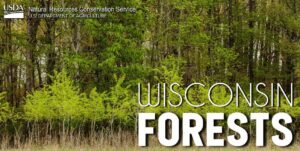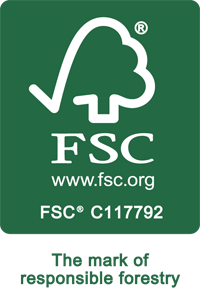
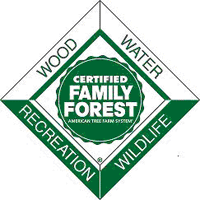 One of the most significant advantages of the MFL Certified Group is its accessibility to forest certification for participating “Group Members.” Many of the certification requirements are covered through how the MFL program is implemented and administered. For example, the two most common paths for landowners to enter the MFL Certified Group are the MFL application and the MFL transfer form. Both paths require prospective Group Members to acknowledge and accept the American Tree Farm System® and Forest Stewardship Council® standards and the MFL Certified Group rules.
One of the most significant advantages of the MFL Certified Group is its accessibility to forest certification for participating “Group Members.” Many of the certification requirements are covered through how the MFL program is implemented and administered. For example, the two most common paths for landowners to enter the MFL Certified Group are the MFL application and the MFL transfer form. Both paths require prospective Group Members to acknowledge and accept the American Tree Farm System® and Forest Stewardship Council® standards and the MFL Certified Group rules.
Private Forestry News
NRCS Funding Available For MFL Landowners
Need funding for the practices in your plan? The U.S. Department of Agriculture’s Natural Resources Conservation Service (NRCS) would like to help. A historic amount of funding will be made available to woodland owners through landowner assistance programs implemented by the NRCS and made possible by the Inflation Reduction Act. See more information here.
What does this mean for you?
This funding is a rare opportunity for MFL landowners. NRCS has identified that “shovel-ready projects identified in a Forest Management Plan are more likely to secure funding.” MFL plans include a schedule of mandatory and recommended practices that may be eligible for NRCS funding.
How to get started?
Contact your local USDA Service Center to learn how NRCS can help fund practices on your MFL property and help you accomplish your forest management objectives. Click the link below for your local USDA Service Center and NRCS contact. Be sure to contact the service center for the county where your property is located, and please be patient with the NRCS staff. The increased funding is driving increased demand at NRCS field offices.
Division Of Forestry Welcomes New Forest Certification Coordinator

Jake Walcisak, Forest Certification Coordinator
Jake Walcisak has joined the DNR Division of Forestry as our Forest Certification Coordinator, administering our three certificates covering more than six million acres of department-owned lands, county forest lands and MFL Certified Group lands. Jake has nearly 15 years of experience in forest management and forest certification and is excited to join the Division of Forestry. Jake began his new role on Jan. 16, 2024, and is stationed at the Prentice Ranger Station.
A graduate of UW-Stevens Point, Jake has worked most of his career in the Wisconsin County Forest System, first in Florence County and most recently as the Taylor County Forest Administrator. Jake has also owned and operated a private forestry consulting business, with work spanning from northern Missouri to the far tip of Michigan’s Keweenaw Peninsula. Jake is excited to engage with the MFL program, as his favorite part of his forestry consulting career was working with MFL landowners.
Jake lives in Prentice with his wife and three young children. Outside work, he is the happiest with a bow in his hands chasing antlered game across North America, or wielding a chainsaw to conduct stewardship practices on his own forestland.
Jake is excited to work with staff and partners in our collective pursuit of sustainable forest management on multi-use and working forests across Wisconsin.
Family, Tradition And Nature
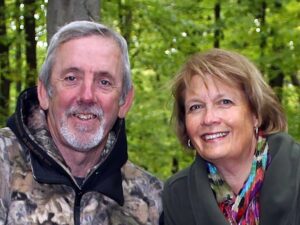
Dennis and Mary Krueger of Waupaca County. / Photo Credit: Krueger family
Family, tradition and nature are three strong pillars to build a happy and successful life. Just ask Dennis Krueger and his wife, Mary, who have made a family and a forest together.
“We have always believed in the importance of traditions in building memories,” Mary Krueger said.
They remember starting the tradition of an annual “Fall Walk in the Woods” in 1988, visiting the farm owned by Dennis’ grandfather. The idea was hatched when a teacher gave their eldest daughter (age 10) an assignment to collect different types of leaves.
“[We] picked an early October afternoon, loaded a backpack with plastic bags to collect leaves and nuts and brought a lunch of peanut butter sandwiches and apples,” Mary Krueger said. “[Our] daughters (ages 10, 8 and 5) and son (age 3) thought this to be the best picnic ever, as we walked a logging trail in a piece of the hardwoods on Grandpa’s farm and settled on a large rock on top of a hill to have lunch.”
Mielke’s Home Is Where His Heart Is
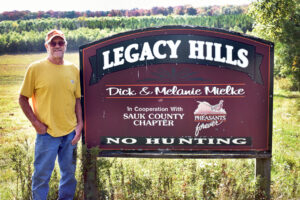
Dick Mielke was born and raised on farmland east of the city of Baraboo, and still lives on the land. He has converted much of it into carefully tended Managed Forest Law property he and his wife call “Legacy Hills.” / Photo Credit: Wisconsin DNR
By Art Kabelowsky, DNR Forest Health Outreach/Communications, Fitchburg;
Arthur.Kabelowsky@wisconsin.gov; 608-335-0167
BARABOO TOWNSHIP — This land has been Dick Mielke’s legacy since the day he was born.
On a warm October morning, Mielke gave a visitor a tour of his property located four miles west of the city of Baraboo in Sauk County. Along the way, he pointed out landmarks that have played pivotal roles in the story of his life.
“If you look over there, you can barely see the house I grew up in, behind those trees. There’s a window. Oops, now it’s gone,” Mielke said while driving an ATV along a logging path on the edge of a tree stand. He and his wife, Melanie, now live in a comfortable ranch-style home they built on the property in 1990.
“My grandfather settled here from Germany right around 1900 … My family has been on the property ever since,” Mielke said.
Get The Latest On Forest Health Topics In Wisconsin
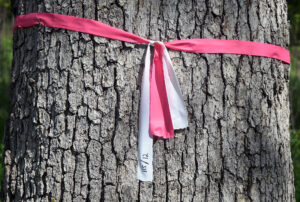
To protect high-value trees against infestation at Big Foot Beach State Park in Lake Geneva, a ribbon shows workers which trees to treat with herbicide or pesticide. / Photo Credit: Wisconsin DNR.
We share a desire for healthy woodlands with landowners participating in the MFL and FCL programs.
MFL and FCL management plans identify and address forest health concerns that are present or possible in your woods when the plan is written. However, the nature of these threats means they evolve over time, and new threats to forest health emerge.
Continue reading “Get The Latest On Forest Health Topics In Wisconsin”
MFL Certified Group Pesticide Reporting Reminder

All owners of certified MFL Lands are required to report their pesticide usage each year. Photo Credit: / Wisconsin DNR
As a Certified Group, we aim for 100% pesticide reporting on certified MFL Lands.
Recent articles have described the pesticide reporting requirements for forest certification. As we approach the end of the year, this is a reminder to submit your report if any pesticides have been applied on your certified MFL property in the past year.
Continue reading “MFL Certified Group Pesticide Reporting Reminder”
Open Seasons And Open MFL Land
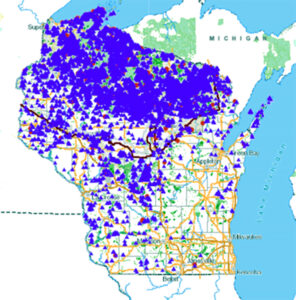
This Wisconsin overview map from Private Forest Lands Open For Public Recreation web map shows the distribution of open tax law lands (each point is a quarter-quarter section containing open land).
Fall has finally arrived in Wisconsin, although the temperatures to kick the season off certainly haven’t felt particularly autumnal. There are many blessings that fall brings, including Badger and Packer football, fall colors, apple and pumpkin pies, and of course fall hunting seasons. In the forest tax law program, we see a spike in interest for open MFL and FCL land this time of year, so it’s a timely opportunity to showcase open tax law lands.
By providing the public recreational access to their MFL or FCL lands, landowners support one of the primary purposes of Wisconsin’s Forest Tax Laws. Lands designated as open MFL provide public access for five recreational activities: hunting, fishing, hiking, sight-seeing and cross-county skiing. Lands designated as FCL allow for public hunting and fishing. Other recreational activities such as trapping and foraging are not permitted on these private open MFL and FCL lands without permission from the landowner.
2023 MFL Audit A Success
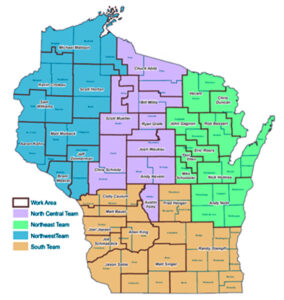
This map shows the Managed Forest Law management zones. / Map Credit: Wisconsin DNR
Back in August, a team of third-party forest certification auditors made their annual trip to Wisconsin to evaluate the performance and administration of the MFL Certified Group to American Tree Farm System® and Forest Stewardship Council® standards.
Over the week of Aug. 12, auditors visited 85 sites in the counties served by the Northeast Tax Law Team. This audit was even more successful than last year, with only a single audit finding and no corrective actions needed. That marks the first annual audit in the history of the MFL Certified Group (dating back to 2005) which resulted in zero corrective action requests!
Applying For MFL And Hiring A Certified Plan Writer
By Nicholas Holmes, DNR Tax Law Forestry Specialist serving Brown, Door, Kewaunee and Outagamie Counties
Is your Managed Forest Law (MFL) Order Commitment expiring? Would you like to reenroll, add land to your current enrollment, or are you considering enrolling in MFL for the first time? You must hire a Certified Plan Writer (CPW) to prepare an application and submit it to the DNR by June 1, 2024.
Managed Forest Law (MFL) expiration letters were mailed in July to landowners whose MFL enrollment expires on Dec. 31, 2024. Landowners who qualify and wish to remain in the MFL program without a lapse in enrollment will need to meet the application deadline of June 1, 2024. Landowners who are not currently enrolled in the MFL but who qualify and wish to enroll as of Jan. 1, 2025 need to meet the same deadline. If there has been a change to your contact information, please inform your local Tax Law Forestry Specialist of your correct address so expiration letters reach the appropriate destination.
Before enrolling, reenrolling or adding land to your current enrollment, familiarize yourself with today’s program requirements and ensure that MFL is a good fit for you. Many changes have been made to the MFL program over the last several years. Landowners are highly encouraged to visit the Managed Forest Law page on the WI DNR website to familiarize themselves with the rules and requirements of the program. Continue reading “Applying For MFL And Hiring A Certified Plan Writer”

